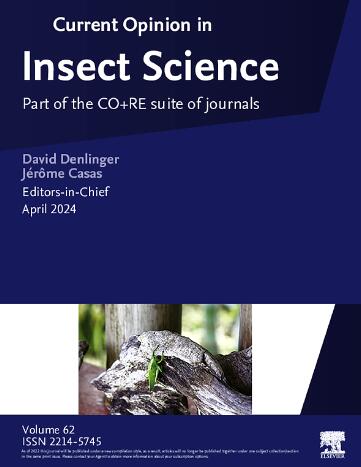Viviparity and obligate blood feeding: tsetse flies as a unique research system to study climate change
IF 4.8
1区 农林科学
Q1 BIOLOGY
引用次数: 0
Abstract
Tsetse flies (Glossina species) are unique organisms that combine several remarkable traits: they are obligate blood feeders, serve as critical vectors for African trypanosomes, and reproduce through adenotrophic viviparity — a process in which offspring are nourished with milk-like secretions before being born live. Here, we explore how climate change will impact the physiological processes associated with live birth in tsetse. This includes considerations of how blood feeding, host–pathogen interactions, and host–symbiont dynamics are likely to be impacted by thermal shifts. The highly specialized biology of tsetse flies suggests that this system is likely to have a distinctive response to climate change. Thus, detailed empirical research into these unique features is paramount for predicting tsetse population dynamics under climate change, with caution required when generalizing from other well-studied vectors with contrasting ecology and life histories such as mosquitoes and ticks. At the same time, the reproductive biology of tsetse, as well as microbiome and feeding dynamics, allow for a powerful model to investigate climate change through the lens of pregnancy and associated physiological adaptations in an extensively researched invertebrate.
采采蝇的胎生与专性吸血:采采蝇作为研究气候变化的独特研究系统。
采采蝇(舌蝇属)是一种独特的生物,它结合了几个显著的特征:它们是专性吸血动物,是非洲锥虫的重要载体,通过腺养胎生繁殖——在这种繁殖过程中,后代在出生之前就被乳汁样的分泌物滋养。在这里,我们探讨了气候变化将如何影响与采采蝇活产相关的生理过程。这包括考虑对血液摄食、宿主-病原体相互作用和宿主-共生体动力学可能受到热变化影响的影响。采采蝇高度特化的生物学特性表明,这一系统可能对气候变化有独特的反应。因此,对这些独特特征的详细实证研究对于预测气候变化下采采蝇种群动态至关重要,并且警告不要从其他经过充分研究的具有不同生态和生活史的媒介(如蚊子和蜱虫)中进行推广。与此同时,采采蝇的生殖生物学,以及微生物组和摄食动力学,允许一个强大的模型,通过怀孕和相关的生理适应的镜头来研究气候变化的广泛研究无脊椎动物。
本文章由计算机程序翻译,如有差异,请以英文原文为准。
求助全文
约1分钟内获得全文
求助全文
来源期刊

Current opinion in insect science
BIOLOGYECOLOGYENTOMOLOGY-ECOLOGY
CiteScore
10.40
自引率
1.90%
发文量
113
期刊介绍:
Current Opinion in Insect Science is a new systematic review journal that aims to provide specialists with a unique and educational platform to keep up–to–date with the expanding volume of information published in the field of Insect Science. As this is such a broad discipline, we have determined themed sections each of which is reviewed once a year.
The following 11 areas are covered by Current Opinion in Insect Science.
-Ecology
-Insect genomics
-Global Change Biology
-Molecular Physiology (Including Immunity)
-Pests and Resistance
-Parasites, Parasitoids and Biological Control
-Behavioural Ecology
-Development and Regulation
-Social Insects
-Neuroscience
-Vectors and Medical and Veterinary Entomology
There is also a section that changes every year to reflect hot topics in the field.
Section Editors, who are major authorities in their area, are appointed by the Editors of the journal. They divide their section into a number of topics, ensuring that the field is comprehensively covered and that all issues of current importance are emphasized. Section Editors commission articles from leading scientists on each topic that they have selected and the commissioned authors write short review articles in which they present recent developments in their subject, emphasizing the aspects that, in their opinion, are most important. In addition, they provide short annotations to the papers that they consider to be most interesting from all those published in their topic over the previous year.
 求助内容:
求助内容: 应助结果提醒方式:
应助结果提醒方式:


